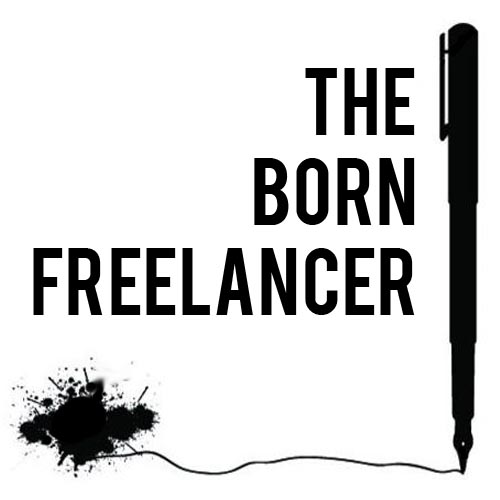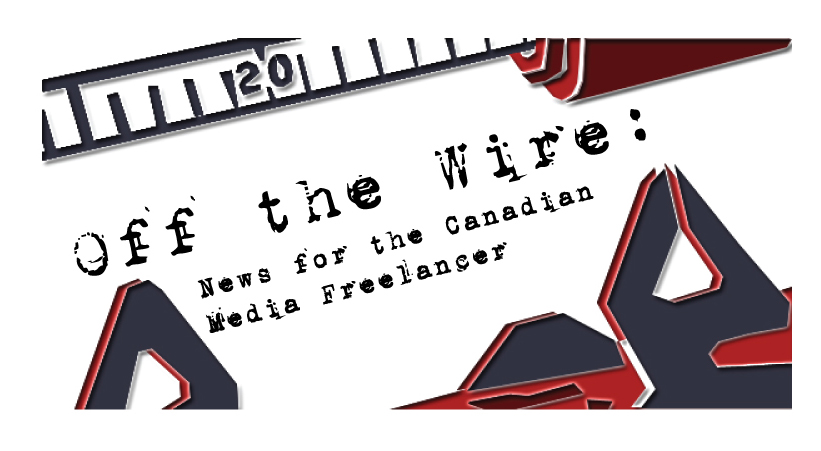SABEW Canada’s 2nd annual Best in Business awards night April 20th
 The Canadian chapter of the Society of American Business Editors and Writers (SABEW) is holding its second annual Best in Business writing awards night on Wednesday, April 20th at Valdez (606 King Street West).
The Canadian chapter of the Society of American Business Editors and Writers (SABEW) is holding its second annual Best in Business writing awards night on Wednesday, April 20th at Valdez (606 King Street West).
Tickets are $25 for members and $40 for non-members. The event starts at 6 pm. Food and drinks will be served.
You can reserve your ticket for the event on SABEW Canada’s Eventbrite page. Check out SABEW Canada’s website for information about the organization, and contact them at sabewcanada@gmail.com with any questions.
The Born Freelancer on Using an Alias
This series of posts by the Born Freelancer shares personal experiences and thoughts on issues relevant to freelancers. Have something to add to the conversation? Your input is welcome in  the comments.
the comments.
• If you work simultaneously in a number of different genres and need to separate and differentiate career strands;
or
• If you simply want to help build a more focused, memorable brand;
you may want to consider using an alias.
I think the first time I used an alias professionally was when I got my first on air job in radio. My program director had a thing about changing the names of his on air staff to names that sounded better. It also had added advantages which I was to learn about as time went by.
Today I choose to use the name at the top of this column in order to write these posts with maximum freedom about all aspects of my freelancing life and to have these words judged solely on their merit rather than on any reputation (good or bad) I’ve acquired elsewhere.
So I’m a big advocate of using different names for different kinds of projects.
Why?
Your name is your most important brand.
To get maximum impact your brand needs to be focused, consistent and promoted. Let me explain how using various aliases may help achieve these goals.
Off The Wire: News for the Canadian media freelancer Mar 8-14
Once a week, we gather stories about the media business, journalism, writing, publishing, and freelancing—with a Canadian focus—and share them in Off the Wire. Who needs a water cooler?

From Canada:
- Chronicle Herald union says company refused call back to bargaining table [CBC]
- Objective journalism disappearing but that’s OK says Pulitzer Prize winner [CBC]
- Chronicle Herald strike stretches into seventh week [J-Source]
- Dear Media Entrepreneurs: It’s time to look north [J-Source]
- Why Gawker’s First Contract Is a Blueprint for Unions [The Tyee]
From The U.S. and beyond:
- How to Become a Freelance Writer That Editors Will Want to Hire Over and Over [The Write Life]
- Is Solutions Journalism the Solution? [Nieman Lab]
- Pay doesn’t look the same for men and women at top newspapers [Washington Post]
- In the Age of Sponsored Content, What’s Ethical for Freelance Journalists? [The Freelancer]
- 5 Ridiculous Excuses About Your Late Payment [The Freelancer]
- The rise of the creative class is the end of retirement [The Kernel]
Last week on Story Board:
- Tips for making it as a freelancer in Canada: CMG Freelance and CWA Canada hosted an event for media workers at The Company House in Halifax last week, focusing on workers’ rights and making it in the industry as a freelancer…
- Vice freelancers, the Canadian Media Guild wants to hear from you: If you’re a regular freelancer for Vice Canada, the Canadian Media Guild would like to hear about your experiences and working conditions…
Spot a story you think we should include in next week’s Off the Wire? Email the link to editor@thestoryboard.ca or tweet us at @storyboard_ca.
Tips for making it as a freelancer in Canada
Media workers meet in Halifax to discuss worker’s rights
By Rebecca Hussman
CMG Freelance and CWA Canada hosted an event for media workers at The Company House in Halifax last week, focusing on workers’ rights and making it in the industry as a freelancer.
The event began with a brief presentation on building a sustainable career in the media by CMG organizer Buffy Childerhose and Katherine Lapointe of CWA Canada.
The presentation started with a tip that’s especially relevant for media workers in the province right now, with the ongoing strike at the Chronicle Herald: value your work and worth.
“The [striking workers] will only be able to negotiate a fair contract with support from the entire media community. And in turn, freelancers and students will stand to benefit from a contract at the Herald that sets fair rates of pay and protects good jobs for the next generation,” Lapointe said.
“The more we can work together the better for us all.”
Childerhose says the most important thing a freelance media worker should remember is: always get it in writing. If no contract is provided, freelancers should at least lay out the terms previously agreed upon in an email to protect themselves. This ensures that there is a copy of the agreement in writing should any issues or disputes arise.
Read the rest of this post »
Vice freelancers: The CMG wants to hear from you
If you’re a regular freelancer for Vice Canada, the Canadian Media Guild would like to hear about your experiences and working conditions.
CMG organizer Karen Wirsig is involved in the Vice Canada unionizing drive that began late last year. She says Vice employees have told her they’re concerned about how freelancers are treated by the company.
“Sometimes they’re paid really late, the rates aren’t great. They may end up being relied upon a lot but still being treated like freelancers,” she says.
Wirsig notes that the contract ratified by newly unionized Gawker employees last week contained clauses related to freelancers. The contract requires Gawker to limit contract work to one year — workers have to be either let go or offered full time work once that year is up — and to pay freelancers the same rates as unionized employees after a year.
Freelance clauses in contracts
Wirsig says these kinds of clauses are possible in other media contracts.
“We could do the same thing in any growing organization that relies on freelancers,” she says.
“We’re organizing at Vice and we’d be interested in talking to freelancers there to see what their experiences are and see what kind of improvements could be made for them.”
Canada already has one media organization that includes freelancers as part of its bargaining unit. That organization is the CBC, where the Canadian Media Guild represents freelancers in addition to full time staff and contract and temporary employees.
“It’s not impossible to include freelancers in a bargaining unit, as we know from the CBC case,” says Wirsig. “It’s possible to have all these people be together in a group and bargain together and look out for each other.”
But whether freelancers are involved in contract negotiations or not, Wirsig says the CMG would aim to bargain some things into a Vice contract that will ensure the fair treatment of freelancers.
What issues do freelancers face at Vice?
The Canadian Media Guild is currently gathering support for the union before filing for a certificate with the Labour Relations Board.
“We’d love to hear from freelancers to find out what other issues they may be facing, because I haven’t talked to a huge number of them yet, I’ve just talked to a couple,” she says.
If you’re interested in sharing your experiences at Vice, please contact Karen Wirsig at karen@cmg.ca. All communications will be kept confidential.
And if you’re interested in reading more about the Vice unionization effort, you can check out this page on the CMG’s website.
Off The Wire: News for the Canadian media freelancer Mar 1-7
Once a week, we gather stories about the media business, journalism, writing, publishing, and freelancing—with a Canadian focus—and share them in Off the Wire. Who needs a water cooler?

From Canada:
- New Trail named magazine of the year at Alberta Magazine Awards [Canadian Magazines]
- Copyright disagreement between educational sector and writers ongoing [TWUC]
- Canadian Journalism Fellowships [J-Source]
- The Chronicle Herald strikers were joined by Nova Scotia labour unions for a rally this week [CBC]
- Are Canada’s Newspapers Too White? Most Refused to Say [Canadaland]
- New blow to Canadian educational writers incomes [ALCS]
- CBC/Radio-Canada funding to increase in upcoming budget: heritage minister [CBC]
- Opinion: Journalism is becoming ‘Uber-ized’ [J-Source]
- Thoughts on machine transcription [Luigi Benetton]
From The U.S. and beyond:
- NYC may pass “Freelance Isn’t Free Act” to help screwed-over freelancers [Gothamist]
- Check out these audio recording apps and find the best one for your reporting [Journalism.co.uk]
- What Gawker’s New Contract Means For The Freelance Workforce [Fast Company]
- My Yearlong Quest to Get Paid [The Freelancer]
- Making Time for Writing? 7 Simple but Powerful Productivity Tips [The Write Life]
- Gawker employees bargain first union contract at a digital media company [The Guardian]
Last week on Story Board:
- Pay Your Interns! film screening and discussion in Toronto on March 12th: Do you think interns ought to be paid for their work? So do we! Come and join us for a screening of the film Pay Your Interns! on March 12 in Toronto…
Spot a story you think we should include in next week’s Off the Wire? Email the link to editor@thestoryboard.ca or tweet us at @storyboard_ca.
Pay Your Interns! film screening and discussion in Toronto March 12
Do you think interns ought to be paid for their work? So do we! Come and join us for a screening of the film Pay Your Interns! on March 12 in Toronto.
The event was organized by filmmaker, Cynthia H. Pandev, who is also hosting the evening. The film screening will be followed by a lecture from Intern Nation author Ross Perlin as well as panel speakers from the Canadian Intern Association, the Canadian Federation of Students and CWA Canada.
Head over to register for your ticket on this Eventbrite page. And then mark your calendars for Saturday March 12 from 6:30 to 9:30 to join us for this free event at Innis Town Hall in Toronto. Refreshments will be served!
Off The Wire: News for the Canadian media freelancer Feb 22-29
Once a week, we gather stories about the media business, journalism, writing, publishing, and freelancing—with a Canadian focus—and share them in Off the Wire. Who needs a water cooler?

From Canada:
- Copyright Board decision ignores cultural damage [TWUC]
- BuzzFeed writer’s harassment just the latest example of why Twitter is broken for women [Globe and Mail]
- Rumours circulate about the future of Canadian Business [Masthead]
- Liberals release details of budget cuts made in 2012, including several made at CBC [J-Source]
From The U.S. and beyond:
- How Freelancers Can Fight Scope Creep [The Freelancer]
- Freelance Writers Can Work Anywhere, Right? Maybe Not. [The Write Life]
- Why You Should Be Pursuing Anchor Clients, and How to Do It [The Freelancer]
- Build a Writing Brand That Rocks: Quick Social Media Tips for Writers [The Write Life]
- 3 ways freelancers give up negotiating power – and how to get it back [Freelancers Union]
- Journalists under threat, from within [Frontline Freelance Register]
- How to Capitalize on Your Article Going Viral [The Freelancer]
Last week on Story Board:
- Vice Media workers of the world, unite! You have nothing to lose but your unicorn!: Workers at Vice Media are leading efforts to unionize digital media workplaces. These efforts have spread internationally from the United States to Canada and the United Kingdom…
- The 5-Minute Freelancer Q&A #27 — Steve Burgess: Steve Burgess is a Vancouver humourist and freelance writer who covers a wide variety of subjects. Currently, his writing appears most often in Vancouver’s 24 Hours, The Tyee, Montecristo and BC Business…
Spot a story you think we should include in next week’s Off the Wire? Email the link to editor@thestoryboard.ca or tweet us at @storyboard_ca.
Vice Media workers of the world, unite! You have nothing to lose but your unicorn!
By Errol Salamon
This post is the second in a series called “E-Lancer Writes,” exploring the working conditions, rights, and collective organizing strategies of freelance journalists, interns, and other low-wage or temporary digital media workers.
 Workers at Vice Media are leading efforts to unionize digital media workplaces. These efforts have spread internationally from the United States to Canada and the United Kingdom.
Workers at Vice Media are leading efforts to unionize digital media workplaces. These efforts have spread internationally from the United States to Canada and the United Kingdom.
Earlier this month, Vice UK workers announced that they’re campaigning to unionize with the National Union of Journalists (NUJ). In August 2015, Vice US editorial employees in the digital verticals voted to become members of the Writers Guild of America, East (WGAE). In December 2015, Vice Canada workers revealed that they’re attempting to organize with the Canadian Media Guild (CMG).
These organizing efforts come after “a wave of unionization in digital media in the last eight months,” wrote Lowell Peterson, WGAE Executive Director, in an email to Story Board.
After Gawker Media workers voted to join the WGAE in June 2015, workers at other digital media outlets quickly followed, including Salon, ThinkProgress, and The Huffington Post. These unionization drives are part of the Guild’s Digital Writers Union campaign.
“The very public decision of the editorial employees of Gawker inspired a lot of other digital media employees to pay attention, and made clear that collective bargaining was a real and viable option for people who work in this area,” wrote Peterson.
However, CMG union organizer Karen Wirsig told Story Board that the concerns of digital media workers aren’t really related to the fact that they’re doing “digital work.”
Read the rest of this post »
The 5-Minute Freelancer Q&A #27 — Steve Burgess
In this regular feature, Story Board asks Canadian writers to share a few details about their work habits and their strategies for navigating the ups and downs of freelance life.
Steve Burgess is a Vancouver humourist and freelance writer who covers a wide variety of subjects. Currently, his writing appears most often in Vancouver’s 24 Hours, The Tyee, Montecristo and BC Business. He’s won two Canadian National Magazine Awards. His book Who Killed Mom? was published in 2011 and made the ‘Best of’ lists of both the Toronto Star and the Globe and Mail.
He took the time to speak with Story Board this week about being your own boss, keeping an open mind, and the importance of discount cheese in the life of a freelancer.
Can you tell me about your strategy for making a living as a freelance writer?
I’m continuing with my freelance writing work but lately I’ve been doing a lot of work for a local film production company called Network Entertainment. They hired me first as a writer so it was a writing thing, I was writing treatments for documentaries. And now they’ve bumped me up the food chain so that I’m co-directing a couple of these things. So these days I’m making a living not just as a freelance writer but also in the documentary film business.
This just kind of landed in my lap. And this may seem strange to say because it’s been a fascinating job and it’s the kind of job that people would kill for. I’ve gotten to travel around and and interview some pretty remarkable people and yet I still feel like, given my druthers, the best possible way to live is if you can just make a living as a freelance writer.
Read the rest of this post »





